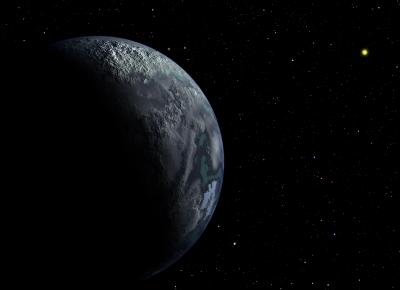This article is more than 1 year old
PLANET-SWAP shock: Stars grabbed dirtballs from other clusters
Galaxy was young then, explain boffins
Space boffins have suggested that billions of stars in our galaxy have captured roaming rogue planets as they tootle through the cosmos.

Artist's impression of a rogue planet tootling through the universe.
Credit: Christine Pulliam (CfA)
The rogue planets, which can be ejected from their own star's system by interaction with a fellow planet during the early stages of a system's formation, float freely out in space. If they pass a different star later on, which is moving in the same direction and at the same speed, they can hitch a ride and end up trillions of miles away.
All this planet-swapping took place long ago in young star clusters. Boffins simulated these clusters and found if the number of rogue planets equaled the number of stars, there was a three to six per cent chance the stars would grab a planet over time.
The clusters then disperse, pulling once-neighbouring planets away from each other to end up hundreds or thousands of times farther from each other than the Earth is from the Sun.
Picking out which planets in the systems we can see are actually rogue planets isn't easy though. These worlds are likely to have an orbit that's tilted in comparison to planets native to the star they end up with, and might even orbit backwards.
But native planets can also end up in tilted orbits just because of the ordinary effects of gravity within a planetary system.
The best evidence to support the rogue planet capture theory was the discover in 2006 by the European Southern Observatory, which spotted two worlds orbiting each other without a star.
"The rogue double-planet system is the closest thing we have to a 'smoking gun' right now," said author Hagai Perets, from the Harvard-Smithsonian Centre for Astrophysics. "To get more proof, we'll have to build up statistics by studying a lot of planetary systems."
As for a rogue planet in our own solar system, astronomers haven't spotted one - yet.
"We can rule out large planets," Perets said. "But there's a non-zero chance that a small world might lurk on the fringes of our solar system."
Hagai Perets' study, co-authored by Thijs Kouwenhoven from Peking University in China, will be published in the next issue of the Astrophysical Journal. ®
